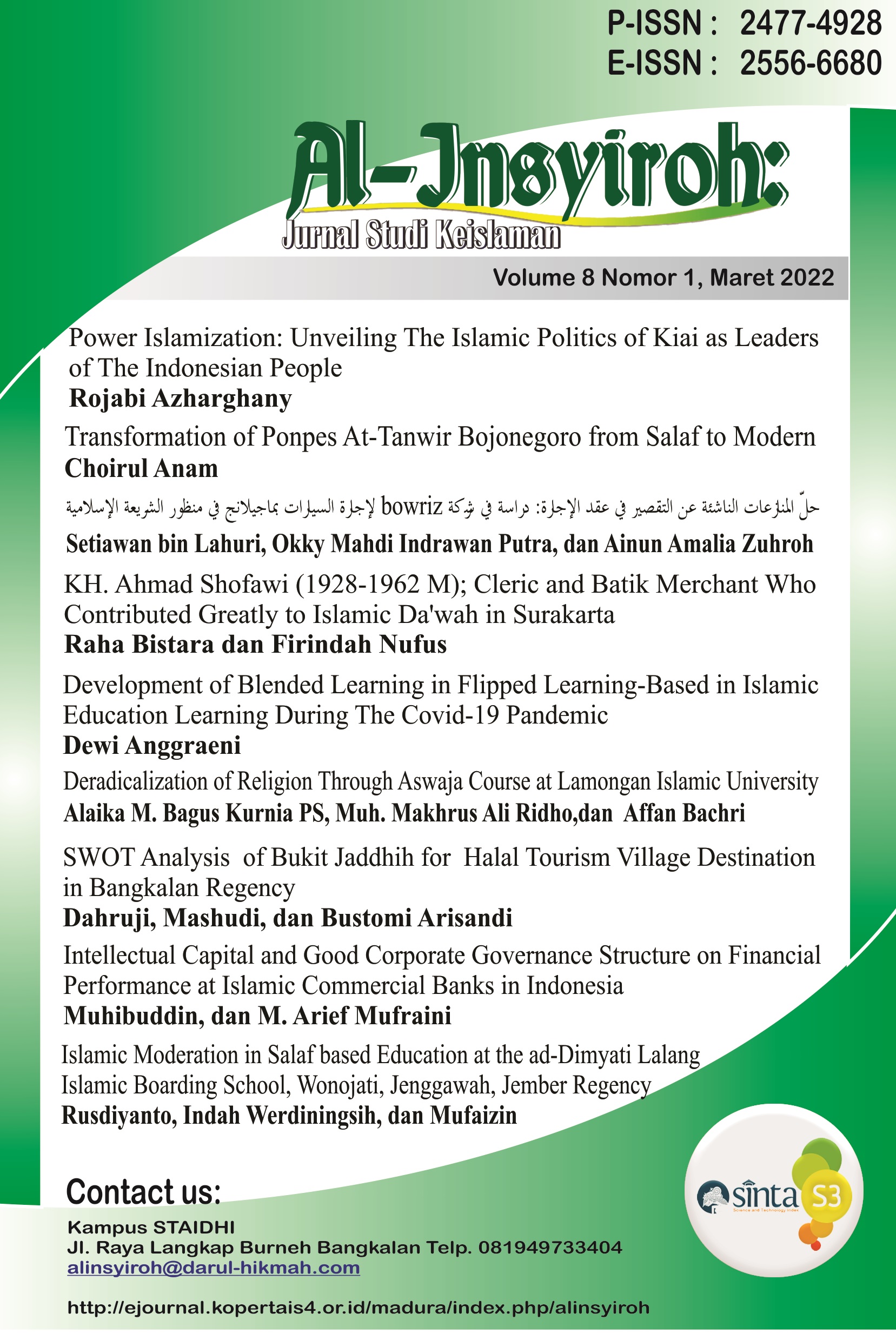Intellectual Capital and Good Corporate Governance Structure on Financial Performance at Islamic Commercial Banks in Indonesia
DOI:
https://doi.org/10.35309/alinsyiroh.v8i1.5235Keywords:
Intellectual Capital, Return on Assets, Financial performanceAbstract
This research article was intended to determine the significance of the influence provided by factors on the financial performance of Islamic commercial banks, which include Intellectual Capital (IC) and Good Corporate Governance (GCG). The subjects involved in this research were Islamic banking in Indonesia which had published its 2019 financial reports. The samples in this research were determined by purposive sampling method, which was based on the criteria that had been determined in this research. Regarding to the sample selection process, there were only 13 companies that published 2019 financial statements. This research was successfully carried out by using Component Based SEM with PLS as a data processing and analysis tool. The results of this research inferred that there was a positive influence of Intellectual Capital and Good Corporate Governance Structure on the Financial Performance of Islamic Commercial Banks in Indonesia. This research provided positive implications for Islamic banks that have seriously managed good Intellectual Capital by implementing a Good Corporate Governance structure that is simultaneously able to increase the company’s financial performance.References
Cheng, M, J Lin, T Hsiao, and T. W. Lin. “Invested Resource, Competitive Intellectual Capital and Corporate Performance.†Journal of Intellectual Capital 11, no. 4 (2010): 433–50.
Ghozali, Imam. Strukural Equation Modeling Metode Alternatif Dengan Partial Least Square (PLS). Semarang: UNDIP, 2011.
Horne, James C Van, and Wachowicz Jr. John M. Prinsip-Prinsip Manajemen Keuangan Edisi Kesembilan. Simon & Schuter (Asia) Pte Ltd, 1998.
Jogianto. Konsep Dan Aplikasi Structural Equation Modeling Berbasis Varian Dalam Penelitian Bisnis. Yogyakarta: UPP STIM YKPN, 2011.
Kholid, M. "Praktik Akad Pembiayaan Gadai Emas Perspektif Hukum Islam." Al-Insyiroh: Jurnal Studi Keislaman 2.1 (2018): 128-137.
Mahfud, Choirul. “Imagined Islamic Societies and The Role of Ulema in Contemporary Indonesia.†Akademiaka: Jurnal Pemikiran Islam 24, no. 02 (2019).
Mahfud, Choirul. Tantangan Global Dan Lokal Islam Di Indonesia. Edited by Alviana C. Yogyakarta: Samudra Biru, 2019.
Mashudi, Mashudi. "Perilaku Dan Budaya Konsumen Madura Dalam Dinamika Etika Bisnis Syariah." Al-Insyiroh: Jurnal Studi Keislaman 2.2 (2018): 133-149.
Muttaqin, Imamul. "Konsep Alâ€Kasb Dan Modernisasi Islam." Al-Insyiroh: Jurnal Studi Keislaman 1.1 (2015): 23-43.
Stewart, T.A. Intellectual Capital: The New Wealth of Organizations. New York: Doubleday / Currency, 1997.
Sucipto. Penilaian Kinerja Keuangan. Jurnal Akuntansi. Medan: Universitas Sumatera Utara, 2003.
Sugiono. Metode Penelitian Pendidikan Pendekatan Kuantitatif, Kualitatifdan R&D. Bandung: Alfabeta, 2013.
Sugiyono. Metode Penelitian Bisnis. Bandung: Alfabeta, 2009.
Suparyanto, Didik. "Prospek Perbankan Syariah di Indonesia." Al-Insyiroh: Jurnal Studi Keislaman 2.2 (2018): 170-181.
Tangkilisan, Hesel Nogi. Implementasi Kebijakan Publik. Yogyakarta: Lukman Offset YPAPI, 2003.
Tjager, I Nyoman, and Et.al. Corporate Governance: Tantangan Dan Kesempatan Bagi Komunitas Bisnis Indonesia. Jakarta: Prenhallindo, 2003.
Downloads
Published
How to Cite
Issue
Section
License
Copyright (c) 2022 Al-Insyiroh: Jurnal Studi Keislaman

This work is licensed under a Creative Commons Attribution-ShareAlike 4.0 International License.

This work is licensed under a Creative Commons Attribution-ShareAlike 4.0 International License.












